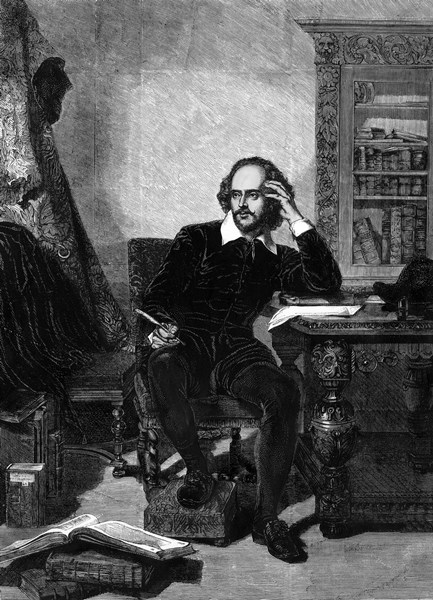Let us do some sonnets this week. We can start with what are called English sonnets, as opposed  to Petrarchan. It is a simple form: three quatrains of 10-syllable “iambic” lines, alternately rhyming, and a final rhymed couplet. This is Shakespeare’s Sonnet 98, not one of the most famous, but an old favorite of mine:
to Petrarchan. It is a simple form: three quatrains of 10-syllable “iambic” lines, alternately rhyming, and a final rhymed couplet. This is Shakespeare’s Sonnet 98, not one of the most famous, but an old favorite of mine:
Sonnet 98, Shakespeare
From you have I been absent in the spring,
When proud-pied April dress’d in all his trim
Hath put a spirit of youth in every thing,
That heavy Saturn laugh’d and leap’d with him.
Yet nor the lays of birds nor the sweet smell
Of different flowers in odour and in hue
Could make me any summer’s story tell,
Or from their proud lap pluck them where they grew;
Nor did I wonder at the lily’s white,
Nor praise the deep vermilion in the rose;
They were but sweet, but figures of delight,
Drawn after you, you pattern of all those.
Yet seem’d it winter still, and, you away,
As with your shadow I with these did play.
Sonnet 73, Shakespeare
That time of year thou mayst in me behold
When yellow leaves, or none, or few, do hang
Upon those boughs which shake against the cold,
Bare ruin’d choirs, where late the sweet birds sang.
In me thou seest the twilight of such day
As after sunset fadeth in the west,
Which by and by black night doth take away,
Death’s second self, that seals up all in rest.
In me thou see’st the glowing of such fire
That on the ashes of his youth doth lie,
As the death-bed whereon it must expire
Consumed with that which it was nourish’d by.
This thou perceivest, which makes thy love more strong,
To love that well which thou must leave ere long.
Sonnet 7, Henry Howard, Earl of Surrey
The soote season, that bud and bloom forth brings,
With green hath clad the hill, and eke the vale.
The nightingale with feathers new she sings ;
The turtle to her make hath told her tale.
Summer is come, for every spray now springs,
The hart hath hung his old head on the pale;
The buck in brake his winter coat he slings ;
The fishes flete with new repairèd scale ;
The adder all her slough away she slings ;
The swift swallow pursueth the fliës smale
The busy bee her honey now she mings ;
Winter is worn that was the flowers’ bale.
And thus I see among these pleasant things
Each care decays, and yet my sorrow springs !
“The Yellow Hammer,” by John Clare
When shall I see the white thorn leaves agen
And yellowhammers gath’ring the dry bents
By the dyke side on stilly moor or fen
Feathered wi love and natures good intents
Rude is the nest this Architect invents
Rural the place wi cart ruts by dyke side
Dead grass, horse hair and downy headed bents
Tied to dead thistles she doth well provide
Close to a hill o’ ants where cowslips bloom
And shed o’er meadows far their sweet perfume
In early Spring when winds blow chilly cold
The yellowhammer trailing grass will come
To fix a place and choose an early home
With yellow breast and head of solid gold.
Leave a Reply